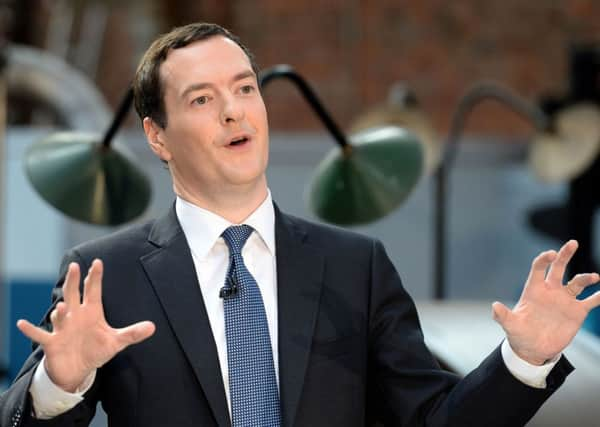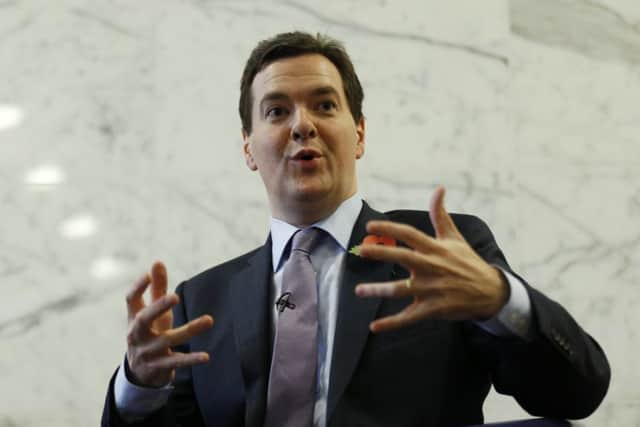High speed Leeds-Manchester rail and elected mayors ‘could transform North’ - Osborne


The offer came as Mr Osborne set out his vision of an economic “powerhouse” in the north of England, featuring improved road links, investment in science and a new high-speed rail link between Manchester and Leeds dubbed HS3.
But the promise of investment in Yorkshire transport drew a barbed response from the Deputy Prime Minister who pointedly referred to the ongoing deadlock between the Government and the Leeds City Region group of councils over how to pay for a proposed £1 billion transport fund.
Advertisement
Hide AdAdvertisement
Hide AdThe fund was part of a “city deal” first agreed by the Leeds City Region and the Government two years ago but the final details are still to be thrashed out


And Nick Clegg today appeared to back the Leeds city region against his Coalition partner.
He said: “George Osborne’s new found commitment today is welcome and we are now hopeful that he will match his words with action by backing the Leeds City Region growth deal and its proposals for better transport links to other cities across the North.”
Elected mayors were rejected in referendums in a number of northern cities in 2012, but Mr Osborne made clear that he was ready to offer a bigger carrot in terms of local decision-making power to tempt the cities to reconsider their opposition.
Advertisement
Hide AdAdvertisement
Hide AdThe combined economic and creative energies of cities like Manchester, Liverpool, Leeds, Sheffield and Hull could compete on a global scale, just as the stars of their Premier League football sides could “wipe the floor with any competition” if they came together in one team, said the Chancellor.
Bringing the cities of the north together could create a second “global city” for the UK, which would be not a rival but a “brother in arms” for London as they fight to grow Britain’s share in the world economy, he said.
Speaking at Manchester’s Museum of Science and Technology, Mr Osborne noted that within 40 miles’ commuting distance of the venue are cities that are home to a total of 10 million people - more than Tokyo, London or New York - with important industries, great universities and areas of natural beauty.
But it is quicker to travel by train from London to Paris than to cross half the distance between Liverpool and Hull, and quicker to drive from Southampton to Oxford than to cover a journey half as long between Manchester and Sheffield.
Advertisement
Hide AdAdvertisement
Hide Ad“The cities of the north are individually strong, but collectively not strong enough,” said Mr Osborne. “The whole is less than the sum of its parts.
“So the powerhouse of London dominates more and more. And that’s not healthy for our economy. It’s not good for our country.
“We need a Northern Powerhouse too. Not one city, but a collection of northern cities - sufficiently close to each other that combined they can take on the world.”
Speaking on a visit with the Chancellor to a Coca-Cola plant in Wakefield, David Cameron said the announcement could help northern cities become greater than the sum of their parts.
Advertisement
Hide AdAdvertisement
Hide Ad“This is an attempt to say ‘Let’s make the most of out great northern cities so we get growth right across our economy’,” he said.
“It’s an exciting vision for linking up Leeds and Manchester and other cities in the North with great transport links, great universities, investment in science and also giving cities the opportunity to look at their governance and whether they want more money and more powers and mayors to drive forward change in our country.
“These things take a long time to get going so I think it’s absolutely right to start that process now.
“There are great urban areas and businesses but we could make sure these cities are greater than the sum of their parts by linking them up with better road and rail networks.”
Advertisement
Hide AdAdvertisement
Hide AdThe Prime Minister and the Chancellor were given a tour of the site, which is set to receive a £13 million investment from Coca-Cola, and also spent time meeting some apprentices in the plant’s canteen.
Mr Osborne said: “This investment by Coca-Cola Enterprises is a vote of confidence in the UK and in our long-term economic plan.
“It is good news that the investment is bolstering the recovery here in the North of England, in Wakefield.
“It shows the potential that exists to create the northern powerhouse that I’m talking about today.”
Advertisement
Hide AdAdvertisement
Hide AdPromising to “think big” on transport links for the north, the Chancellor indicated that an upgraded, high-speed link between Manchester and Leeds should be considered as part of the review of the second phase of the HS2 project linking London to the Midlands and the North.
“We need an ambitious plan to make the cities and towns here in this northern belt radically more connected from east to west - to create the equivalent of travelling around a single global city,” said Mr Osborne. “As well as fixing the roads, that means considering a new high speed rail link.”
The aim should be to create a “radical transport plan so that travelling between cities feels like travelling within one big city”, he said.
Mr Osborne said he was willing to “back up” a third high-speed rail line with Government money, but declined to put a figure on any investment, telling BBC1’s Breakfast that the project could come in at around £6-7 billion if priced at the same cost per mile as HS2, but was likely to work out cheaper because it would be able to use existing rail corridors.
Advertisement
Hide AdAdvertisement
Hide AdHe also said there was a “strong case” for more elected mayors who could drive growth and development in northern cities.
“A true powerhouse requires true power,” he said. “So today I am putting on the table and starting the conversation about serious devolution of powers and budgets for any city that wants to move to a new model of city government - and have an elected mayor.”
A previous bid to install directly-elected mayors - championed by Prime Minister David Cameron - was soundly dashed in May 2012 when the residents of nine major cities rejected the idea In referendums.
Manchester, Nottingham, Sheffield, Leeds, Newcastle, Bradford and Wakefield were among those to oppose the plan - along with Birmingham and Coventry - with only Bristol bucking the trend.
Advertisement
Hide AdAdvertisement
Hide AdBut Mr Osborne said the cities should consider the value to London of having a strong and globally-recognised city leader in Boris Johnson - “the haircut that is recognised all over the world”.
“There’s a mis-match between the economic importance of the great northern cities and their political clout,” he said.
“Wales has its own parliament, and can pass its own laws... The economies of Manchester and Leeds are each individually bigger than Wales. But they don’t have a single leader who can speak for the whole area.”
Mr Osborne also called on northern universities to propose “radical, transformative long-term ideas” to bid for a share in £7 billion of investment in science over the coming five years.
Advertisement
Hide AdAdvertisement
Hide AdAnd he said that the first allocation of the £2 billion Single Local Growth Fund investment, due to be announced in a fortnight’s time, would go on long-term projects to drive growth over many years.
Shadow chancellor Ed Balls said: “Nobody will believe the Tories can deliver the jobs, growth and investment we need for the north of England.
“Regional growth divides have widened markedly since 2010. The Tories scrapped Labour’s successful regional development agencies, failed to implement Lord Heseltine’s growth report and are planning to cut infrastructure investment next year.
“On high-speed rail, we said months ago that we need value for money for the taxpayer and to improve the existing plans to maximise the benefits for the whole country and strengthen the links between northern cities. Ministers need finally to start listening.”
Advertisement
Hide AdAdvertisement
Hide AdAnd former deputy prime minister Lord Prescott said that much of Mr Osborne’s vision echoed the Northern Way initiative, which he launched in 2004 to drive growth and improve connections across the region but which was scrapped by the coalition Government, along with the RDAs, in 2011.
“This is more about Northern votes than Northern growth,” said Lord Prescott.
“There’s no money, just a declaration from the very same man who abolished the Northern Way three years ago. He is trying to reverse his own damaging decision and we haven’t seen any detail, because there isn’t any detail. “
Stephen Joseph, chief executive of Campaign for Better Transport, said: “The Chancellor’s call for more rail investment to link northern cities is welcome but runs counter to the Government’s current consultation on northern rail services.
Advertisement
Hide AdAdvertisement
Hide Ad“This plan would mean 30-year-old diesel trains still being used and suggests service cuts and fares increases. The Government should commit wholeheartedly to real investment and growth in the north’s rail network, rather than sending out these mixed messages.”
Adam Marshall, executive director of policy at the British Chambers of Commerce (BCC), said: “Businesses have seen many proposals for better links between northern cities over the years. The prospect of a high-speed east-west rail link across the North is a good start if it materialises, but we would like to see more thought given towards connecting all the core cities in the north, not just Manchester and Leeds.
“While the Chancellor’s ambition for a Northern ‘HS3’ is positive, the Government must focus on getting HS2 on the statute books and into construction first, and on vital road and rail improvements throughout the UK. Businesses like this sort of ambitious thinking, but will be far more impressed if the Government’s existing list of infrastructure commitments are delivered.”